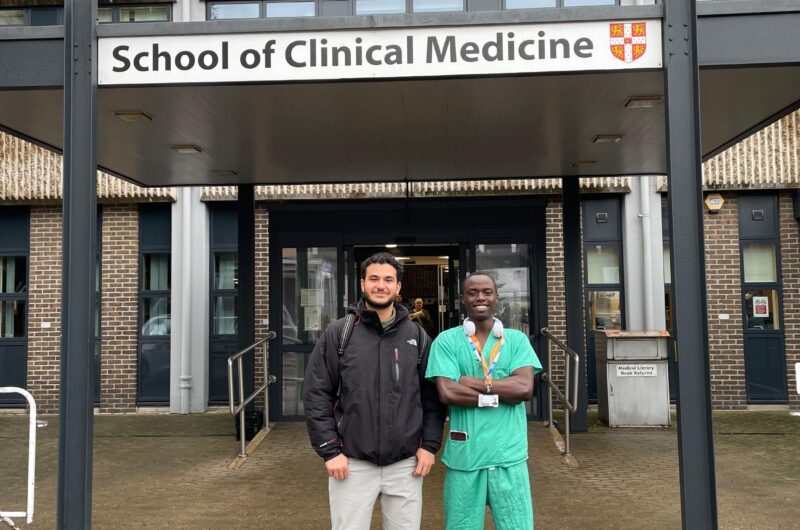By Antony Mutunga Ngunga
Antony Mutunga Ngunga is final year medical student at Masinde Muliro University of Science and Technology in Kenya. He spent six weeks on elective in Cambridge shadowing and learning from healthcare staff and medical students at Addenbrooke’s Hospital, an experience that has reinforced his commitment to address healthcare gaps between high-income and low-resource settings.
“My inspiration to engage in global health stems from my experience as a medical student training in a resource-limited hospital. Working in an environment where essential diagnostic tools, specialized care, and timely interventions are often unavailable opened my eyes to the stark healthcare disparities that exist between high-income and low-resource settings.
I have witnessed firsthand how delays in referrals, shortages of essential medications, and limited access to specialized care impact patient outcomes, particularly in fields like neurology and obstetrics, where timely intervention is critical. These challenges made me deeply aware of the systemic barriers to quality healthcare and fuelled my desire to be part of the solution.
My exposure to the well-structured, multidisciplinary, and patient-centered approach in the UK during my Cambridge elective reinforced my belief that evidence-based, innovative solutions can be adapted to improve healthcare delivery in resource-limited settings. This realization has driven my passion for bridging healthcare gaps, fostering collaborations, and contributing to sustainable healthcare improvements in Kenya and beyond.
Global health presents an opportunity to learn, adapt, and implement strategies that not only improve patient care but also strengthen healthcare systems at a broader level. I am committed to this journey and eager to actively contribute to meaningful global health initiatives, particularly through CGHP’s projects in Kenya.
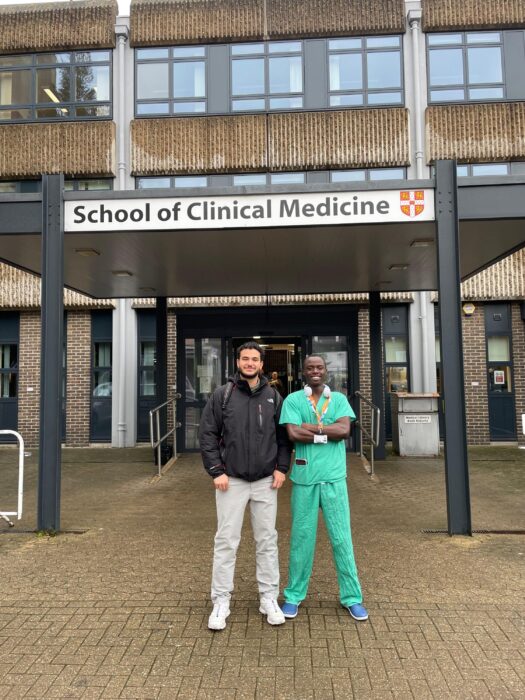
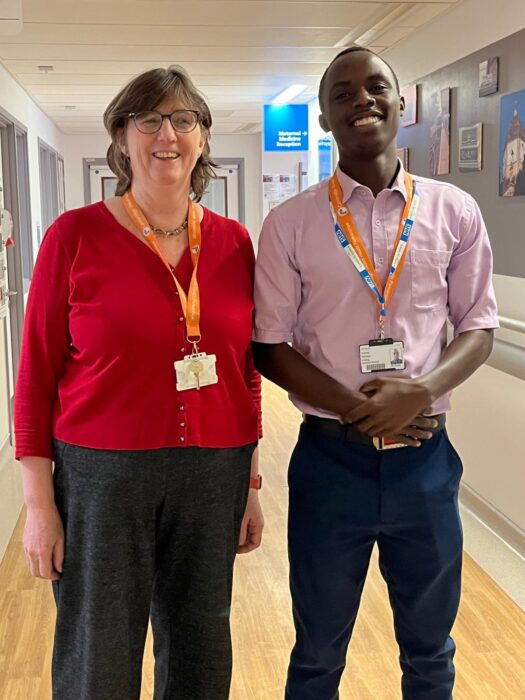
My experience
During my six-week elective at the University of Cambridge, I was primarily involved in clinical observations, ward rounds, and multidisciplinary team discussions across various departments, mainly Neurology. I assisted in patient assessments, participated in case discussions, and engaged in teaching sessions with medical students and registrars. Additionally, I was involved in clinical skills training sessions and research workshops, case discussions, gaining insight into evidence-based practice and global health perspectives.
My primary contributions were in cross-cultural medical exchanges, providing insights into healthcare challenges in low-resource settings, particularly neurological conditions and Obstetrics and Gynaecology practices in Kenya. I contributed to case-based discussions, sharing experiences of managing similar conditions in resource-limited settings, which fostered meaningful conversations about adaptable interventions. The biggest impact was fostering mutual learning, where both Kenyan and UK healthcare professionals could compare approaches, leading to discussions on how to optimize patient care in different healthcare systems.
Challenges and rewards
One of the most challenging aspects was navigating Cambridge as a visitor. The city’s unique layout, with its winding streets made it easy to get lost, especially in the first few days. Finding specific hospital and/or University departments or lecture halls was sometimes confusing, and the cold, damp weather added another layer of difficulty, making long walks between locations even more taxing. However, over time, I adapted by using maps, asking for directions, and familiarizing myself with key landmarks.
Despite these initial struggles, the most rewarding part of the experience was the exposure to a patient-centered, multidisciplinary approach, which highlighted the importance of teamwork in improving patient outcomes. Networking with experts in various departments at Addenbrooke’s also provided invaluable career guidance and mentorship opportunities.
Personal and professional development
This elective broadened my perspective on healthcare systems, global health and deepened my appreciation for evidence-based medicine. Overcoming the initial challenges and managing cultural differences strengthened my adaptability and resilience.
Professionally, I gained first-hand experience in multidisciplinary teamwork, advanced clinical decision-making, and ethical considerations in patient centered care. Exposure to research-focused discussions has inspired me to incorporate research into my future clinical practice.
My exposure to the well-structured, multidisciplinary, and patient-centered approach in the UK during my Cambridge elective reinforced my belief that evidence-based, innovative solutions can be adapted to improve healthcare delivery in resource-limited settings

Elective highlights
One of the most unforgettable moments was when Prof. Tony Jewell took me to Christ’s College. As we walked through the historic grounds, I suddenly realized I was standing on the same ground that Charles Darwin once did. The weight of that moment was profound—being in the very place where one of the greatest scientific minds developed ideas that would change our understanding of life itself. It was an inspiring and humbling experience, reinforcing my passion for science and discovery.
Another highlight was attending the Cambridge Global Health Partnerships (CGHP) Fundraiser Dinner at Newnham College. The evening was filled with thought-provoking conversations, and I had the privilege of meeting incredible individuals dedicated to global health. The atmosphere of collaboration and shared purpose made it a night to remember. I forged unforgettable friendships with professionals from diverse backgrounds, and these connections have already begun to shape my future aspirations in global health.
Finally, a group of Kenyan staff at Addenbrooke’s hospital, Led by Nurse Mercy Adera, taking me toLondon was another remarkable experience. Walking through the streets of such a historic and vibrant city, seeing iconic landmarks like the Houses of Parliament, The Stamford Bridge, The London Eye, and River Thames, made me appreciate the cultural richness of the UK. It was an incredible way to reflect on my journey, from my medical studies in Kenya to an elective at Cambridge and now standing in one of the world’s most influential cities.
Each of these experiences added a unique dimension to my elective, making it not just an academic journey but a deeply personal and transformative one.
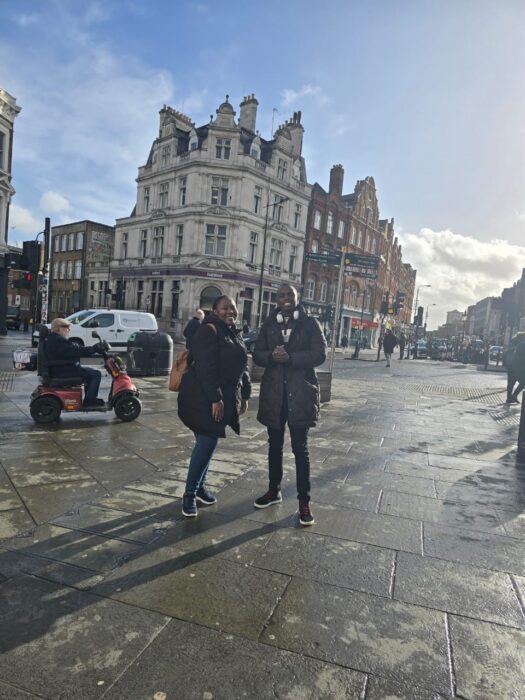
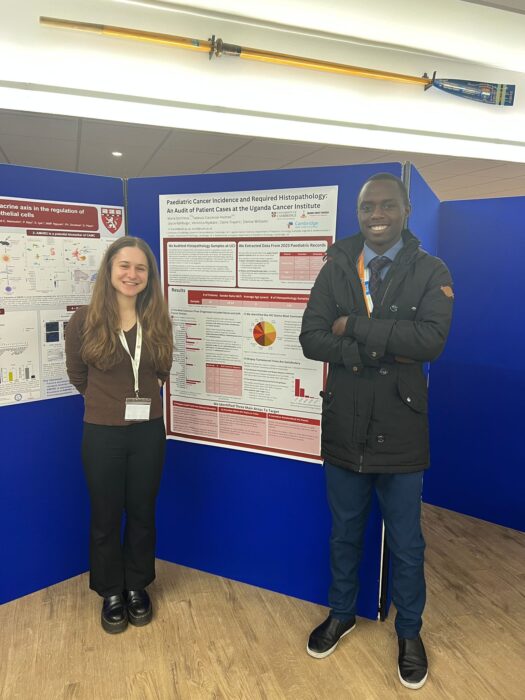
Learning and impact
I plan to present my key learnings from Cambridge to my peers and faculty at the School of Medicine, Masinde Muliro University of Science and Technology, focusing on:
- Obstetric emergency response and referral system efficiency
- Multidisciplinary stroke management and its applicability in Kakamega.
- The role of digital health in neurology and obstetrics.
Additionally, I am exploring potential collaborative research on maternal health challenges and stroke care in Kenya with Cambridge colleagues.
To maximize impact, I plan to:
- Deliver departmental presentations at our University and teaching hospital to discuss how Addenbrooke’s obstetric and neurology approaches can be adapted in Kenya.
- Engage in flipped classroom sessions to facilitate ongoing knowledge exchange between Kenyan, Cambridge, and Ukrainian medical students.
- Explore potential training initiatives, particularly in obstetric emergency preparedness and stroke management strategies for local healthcare workers.
Final reflections
I would highly recommend global health work to my peers. It provides an opportunity to understand different healthcare systems, learn best practices, and develop innovative solutions to local challenges. Exposure to advanced medical practices, multidisciplinary care, and structured training methods fosters professional growth and a deeper appreciation for healthcare equity.
Looking ahead
I am highly motivated, fully prepared, and eager to actively participate in CGHP’s future projects in Kenya and neighboring countries. My goal is to translate my learning from Cambridge into tangible impact, working alongside CGHP to strengthen healthcare systems, medical training, and patient outcomes. I am not just interested in being a past elective participant, I want to be an active partner in meaningful, sustainable projects, such as:
- Improving obstetric referral systems and emergency preparedness in Kenya to reduce maternal and neonatal mortality.
- Exploring stroke care optimization in resource-limited settings by advocating for better triage protocols, rehabilitation strategies, and telemedicine use in neurology.
- Advocating for multidisciplinary neurology and obstetric care models in Kenya to enhance patient outcomes through team-based approaches and structured clinical pathways.
- Engaging in collaborative research on maternal health and neurology in developing countries, with a focus on practical interventions that can be implemented in low-resource settings.
My Cambridge elective reinforced my deep commitment to bridging healthcare disparities between high-income and low-resource settings. I am keen to actively engage, contribute, and collaborate with CGHP and other global health organizations to drive meaningful and sustainable healthcare improvements in Kenya and beyond.”
Find out more about ethical elective opportunities with CGHP’s partnership programmes, or contact us at info@cghp.org.uk
Return to blogs

